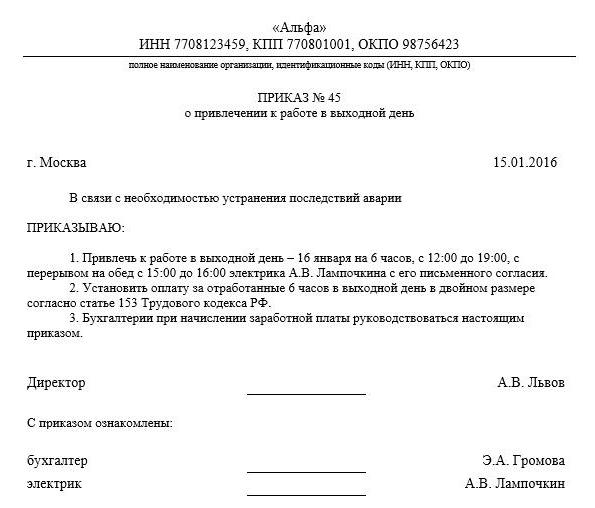Going to work in weekends, holidays may occur due to production needs, urgent repair work or performance of a job of a complex nature. Thus, the Labor Code of the Russian Federation provides for the possibility of calling an employee under the strict condition of consent on his part. In this article, you will learn about all aspects of working on weekends, holidays, or night hours. In addition, the reader has the opportunity to see reflective weekend work order sample and familiarize yourself with other documentation relevant to the current topic.
General information

Today, work on holidays and weekends for most structures is nothing more than a production necessity. In accordance with Russian law, it is now possible to carry out labor activities on officially non-working days strictly for the following reasons:
- Certain requirements of a production and technical nature on the part of the work process.
- An urgent need in the field of public services (cafes, restaurants, shops, transport, medicine and so on).
- Loading and repair work of an urgent nature.
It is important to note that weekend work order In such serious circumstances, it presumes special rules regarding the call of employees for work. In addition, their work, one way or another, is subject to compensation beyond the prescribed time. What are the nuances in any case you need to keep in mind? The answer to this question can be found in subsequent chapters.
When allowed and when prohibited
Today weekend work (Labor Code of the Russian Federation Art. 113 h. 1) is prohibited in almost all cases. However, as in any rules, there are exceptions, according to which Russian law gives the employer the right to attract his employees to carry out labor activities these days.
Thus, in view of the emergence of unforeseen work, the normal activities of the organization as a whole depend on the urgent performance of it under any circumstances, but it was impossible to plan and predict it earlier on the part of the management, the employer has the right to call the employee on the weekend. Nevertheless, the above situation necessarily requires the written consent of the employee in accordance with the second part of Article 113 of the Russian Labor Code.
For example, bring to work on a day off You can accounting staff at the time of delivery of financial statements. So, for several days or on the eve of the proposed exit, the employee agrees to issue a consent to carry out labor activities on rest days in writing. It is important to add that the time period for which it is necessary to warn an employee has not been legally established to date. Then, when the written consent of the employee to work in weekends, holidays the employer did not have time to receive (for example, the employee agreed, but only verbally), to carry out this operation is possible and necessary on the very day when he goes to work.
Strict duty

In addition to the above information, there are currently situations where an employee agrees to go to work on holidays or weekends, even when he did not give his own consent to it. Among them are the following items:
- Going to work to eliminate or prevent the consequences of a natural disaster, industrial accident or disaster.
- Weekend work (shopping mall RF) to prevent damage or destruction of property complexes of the tenant, municipal or state property, as well as accidents.
- Going to work for the execution of orders, the need for which is determined by the introduction of martial law or a state of emergency, as well as emergency work under extraordinary circumstances, that is, in case of a disaster or its threat. This may include fire, flood, famine, earthquake, epidemic or epizootic. In addition to these circumstances, it is necessary to pay attention to other cases that somehow endanger normal living conditions or directly the life of society (its parts). It is necessary to supplement that weekend employment procedure and holidays in this case are regulated by paragraphs 1-3 of the third part of Article 113 of the Russian Labor Code.
Useful services and additional information

When is it possible at the legislative level weekend overtime? Today, to find out which day in the current 2017 is a holiday, weekend or shortened, there is an opportunity in the production calendar. It is through him that one can get hold of information on the norm of working hours per quarter, month or week, subject to different lengths of the working week.
It should be noted that weekend work order does not imply equating work on Sunday or Saturday in accordance with the shift schedule to work on weekends. Then, when the change falls on a holiday, it is relevant to apply the provisions of Article 113 of the Russian labor legislation. Currently, the judicial authorities emphasize that holidays are such for absolutely all employees of various companies, which does not depend on whether work is provided for on these days in the shift schedule.
Thus, when a shift worker is involved in labor activities on a public holiday (even when this day is identified as a worker in accordance with the schedule), work is paid in increased amounts.
Documentation relevant for calling an employee

To date, the main paper, which serves as the basis for attracting an employee to work on non-working days and weekends, is weekend work order (sample presented above). This provision complies with part eight of Article 113 of the Russian labor legislation. It is important to note that its design is made in an arbitrary form. However, practice has shown that weekend work order or a holiday includes certain requirements that are relevant in the process of registration itself. Among them are the following items:
- Mandatory indication of the surname, name, patronymic of the employee.
- Specific days when the employee must work.
- Weekend work order also includes a structural unit where the employee will carry out labor activities.
In order to avoid possible disputes and disagreements, it is advisable to draw up an order in duplicate and issue one paper to the employee against signature. So, the two parties will have documentary evidence of this call, and if necessary, the employer will be able to present evidence that the employee was notified about the call on a weekend or holiday. In addition, you can ask the employee to issue consent to work on a day off separate paper.It must be added that its compilation also corresponds to an arbitrary form.
Actual today forms

It is important to note that today weekends and holidays and other conditions are determined by order drawn up in accordance with one of two forms:
- T-12 "Report card for calculating wages and accounting hours of work."
- T-13 "Time sheet."
By the way, at present, there is a third version of the execution of the order, but it is used much less often. So, it is possible to provide in a paper drawn up directly by the head, two lines for affixing a signature to an employee: “Agree” and “Disagree”. The text of the order should include a quote from the second part of Article 113 of the Russian labor legislation indicating the employee’s right to refuse to work on weekends or holidays. By the way, in case of consent, the employee is supposed to pay compensation or day off for work on the day off (shopping mall RF).
It should be noted that the implementation of labor by an employee on holidays or weekends must also be reflected in the time sheet (the above uniform forms). To do this, it is necessary to put down a code from the letters "RV" or from the numbers "03" in the corresponding column under the date at the top of the cell. He talks about working hours on holidays and weekends. In the lower part of the cell, you need to specify the specific number of hours that the employee worked on that day.
Pay for work on a day off (Labor Code of the Russian Federation)
Currently, the current legislation provides for two options to compensate for the work of employees on holidays and weekends. Among them are the following items:
- Providing an additional day for rest and standard payment of the day.
- Double pay for work on the day off (Labor Code Art. 153).
It should be noted that the option of receiving compensation is selected directly by the employee. He has the right to draw up a separate application document after the worked weekend, holiday or indicate the necessary information in the consent, which is executed in writing and submitted before going to work.
Surcharge for work

If we touch on the topic of a specific amount of surcharge, then it depends on the remuneration of the employee. So, with respect to the pieceworkers, the compensation payment should be set at an amount equal to or exceeding the double piecework rate, and for those whose labor is paid in accordance with the daily (hourly) tariff rates - at an amount equal to or exceeding the double rate. Besides, night work on the day off determined by the rules that are set directly by the employer. These provisions are regulated by the first part of Article 153 of the current labor legislation of the Russian Federation.
It will be advisable to consider, using a concrete example, how the employer agrees to pay work on a holiday for various categories of workers when the latter chose a compensation payment, rather than an additional day off.
Examples
So, for starters, it will be useful to familiarize yourself with the calculation of the amount of the compensation payment for work on holidays and weekends in the case of piecework pay. Employee X works as a courier. In May of this year, he delivered commercial products in accordance with 109 addresses. At the same time, he carried out his own labor duties 05/01/2017 and 09/09/2017. It's no secret that these days are considered holidays. The courier made fourteen trips in two days. In this case, the amount of payment for any departure is 250 rubles.
The basic salary for May, with the exception of holidays, can be calculated as follows: (109 - 14) x 250 = 23,750 rubles. Surcharge for the implementation of labor activities 05/01/2017 and 05/09/2017 is: 14 x 250 x 2 = 7000 rubles.So, the total amount of the courier’s salary is 30 750 rubles.
In addition, it would be advisable to calculate the size of the compensation payment for work on holidays and weekends in the case of remuneration in accordance with the hourly tariff rate. In May of this year, the employee worked for 151 hours. It must be taken into account that he also performed his own labor duties on Saturday (05/20/2017) and worked for eight hours. In this case, the hourly rate is 350 rubles per hour.
So, the basic wage plan for a month, if you do not take into account work on a day off, is: (151 - 8) x 350 = 50 050 rubles. Surcharge for the implementation of labor activity on a weekend is: 8 x 350 x 2 = 5600. Thus, the total amount of the courier's salary for May of this year is 55,650 rubles.
It is necessary to pay attention that through the current labor legislation of the Russian Federation only a minimum amount of surcharge for the implementation of labor activity on holidays and weekends is established. The structure is entitled to establish a specific amount in an independent manner by writing this provision in the labor (collective) contract. In addition, Russian tax law allows you to take into account absolutely the entire amount of surcharges in salary expenses for calculating personal income tax.
Compensation as an extra day of rest

In the final chapter, it would be advisable to consider such an option to compensate for work on a holiday or a day off, as an additional day of rest. However, in this case, it is necessary to take into account several nuances. Initially, it should be noted that, in one way or another, the employee agrees to express his own consent to receive such compensation by filling out the corresponding application in any form. It is necessary to add that you can also indicate relevant information in a written consent to work on a holiday or day off. The current labor legislation of the Russian Federation does not currently contain a direct instruction, however, the judicial authorities emphasize that the usual signature in the order to call an employee on a holiday or day off is not enough to provide him with an additional day of rest.
In addition, it is precisely the written consent of the employee to receive additional rest in one way or another that will allow in the future to avoid possible disputes and disagreements with the employee, as well as confirm the fact that he has chosen this particular type of compensation. It is important to note that in the current labor legislation of the Russian Federation there is no strict indication of when the employer should provide the employee with a day of rest. That is why the latter has the right to request absolutely any day at his discretion.
In the event that the employee decides to quit, but work on a holiday or day off remains uncompensated for him on an additional day of rest or in material terms, then monetary compensation should be sent to him. Then, when an employee arbitrarily took a “day off” without agreeing this with the employer in advance, this behavior is generally recognized as absenteeism, which means that this is a disciplinary sanction (usually in the form of an explanatory note directly from the offending employee). Here, everything depends solely on the seriousness of the employee’s labor duties, because the three main types of disciplinary sanctions that are known today (explanatory, reprimand or dismissal) are applied in different cases.